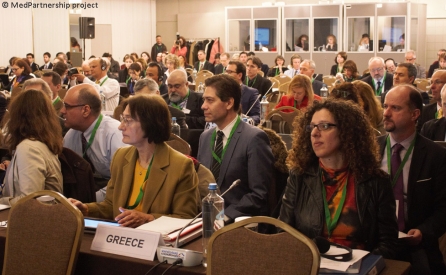Search
02/16: Mediterranean countries renew their commitment to protect the Mediterranean Sea
Athens, 9 February 2016 – More than 150 delegates from 21 Mediterranean countries and the European Union, all parties to the Barcelona Convention, are meeting in Athens from 9 to 12 February to decide on key environmental issues related to the marine and coastal areas of the region.
Hosted by the Hellenic Government, this 4-day UN meeting is expected to discuss and adopt basin-wide strategies, among them the Mediterranean Strategy for Sustainable Development 2016-2025, the medium-term strategy of the Mediterranean Action Plan (MAP) for the coming 6 years, other key action plans in the areas of offshore, pollution, biodiversity, coastal zone management and climate change adaptation.
The meeting was opened by Prof. Mehmet Birpinar, President of the Bureau of the Barcelona Convention who stressed in his speech on the achievements realized during the two years of Turkey’s presidency. Highlighting the improvement of the status of compliance of countries he declared: "we still need more progress on this issue. I am sure that we all agree that full compliance must be achieved".
The Meeting is taking place at a decisive moment following last year’s breakthroughs on the 2030 Sustainable Development Agenda and the Sustainable Development Goals at the UN Summit in September 2015 and on climate change in Paris in December 2015.
UN Under-Secretary-General and UNEP Executive Director Achim Steiner, addressed the participants - in a recorded message – and highlighted the proud record of the Barcelona Convention as being the only legally binding instrument that addresses the management of the unique ecosystem of the Mediterranean. Steiner emphasized that “the year 2015 laid out a new trajectory with the New York meeting and the adoption of the Sustainable Development Goals (SDGs) and the Paris Summit on Climate Change“, confirming that the Barcelona Convention will have a key role in achieving these goals in the Mediterranean. Expressing UNEP’s profound commitment to supporting the Convention and the entire MAP system, he emphasized that “the Barcelona Convention continues to symbolize an attempt to not only create instruments along a trajectory of issues, particularly problems related to pollution, but actually bringing nations together and uniting them around the management of a shared ecosystem”.
Welcoming the participants, H.E Mr. Ioannis Tsironis Alternate Minister of Environment & Energy of Greece said: “It is an honor for our country to host this very important meeting between all the historical Mediterranean countries, at a particularly critical point in time. The integration of United Nations goals for sustainable development, the transition to green and blue economy, the implementation of a new agreement on climate change in Paris and the efforts to revive and strengthen the stagnant economy, are processes with serious consequences at all levels and they form the field in which we all need to work systematically."
The meeting coincides with the 40thanniversary of the Mediterranean Action Plan-Barcelona Convention, which represents one of the most advanced legal regimes worldwide for the protection of marine and coastal environment. This first-ever agreement under the United Nations Environment Programme's (UNEP) Regional Seas umbrella has served as a model for the 12 subsequent Regional Seas cooperation frameworks around the world.
It also comes at a key moment for the Mediterranean, as the region is integrating the agreed universal goals into its own sustainable development agenda, transitioning to a green and blue economy.
“We have a strong structure of regional level policies, strategies and plans in place in the Mediterranean. Therefore as we look to the future, the need for implementation is more important than ever. The next biennium will have a core focus on two lines of action. One is to support countries in the implementation of this ambitious agenda discussed at this COP, directly and through stronger partnerships and collaborations, and the other to work towards a more rigorous and integrated monitoring and towards more quantitative state of environment reporting, so that we shall be able to assess the impact of our action in the Mediterranean in a systematic way. This will also ensure the effective and efficient use of our human and financial resources in the future”, said Gaetano Leone, UNEP/MAP Coordinator.
During a high level event with the theme "Forty Years of Cooperation for Healthy and Productive Mediterranean Sea and Coast: A Collective Journey Towards Sustainable Development" the region's ministers will take stock of the successful first four decades of the Barcelona Convention. They will also draw a roadmap for the sustainable development of the Mediterranean in the coming ten years, within the framework of the global SDGs.
Mediterranean Ministers are also expected adopt the Athens Declaration, in which they will renew their commitment to address the challenges related to environmental protection and sustainable development of the Mediterranean Sea and coast, within the global framework of the 2030 Agenda for Sustainable Development.
Notes to the Editor
About MAP: The Mediterranean Action Plan (MAP) was adopted in 1975 by Mediterranean countries and the European Community under the auspices of the United Nations Environment Programme’s Regional Seas Programme to monitor and protect the Mediterranean marine environment from pollution threats while ensuring the integrated development of the natural basin’s resources on the basis of multilateral cooperation.
About the Barcelona Convention : In 1976, Mediterranean countries and the European Community adopted the Barcelona Convention for the Protection of the Mediterranean Sea Against Pollution as the legal basis for international cooperation in protecting the Mediterranean environment.




Find Us On...